For instance, it’s difficult to work when you don’t feel well; energy and focus is hard to maintain; medical insurance can be expensive; and you’re not always productive, which cuts into your bottom line.
“I do not have enough energy to work with my employees all day and I have difficultly concentrating and focusing when I am tired,” says Kim Bart, owner of PomJoyFun, an online party décor business. Bart has fibromyalgia and Ehlers-Danlos syndrome, a connective tissue disorder.
“The pain and exhaustion are the worst. I don’t have stamina and the pain can make it so I can’t work at all. I can work about half the amount the average person can.”
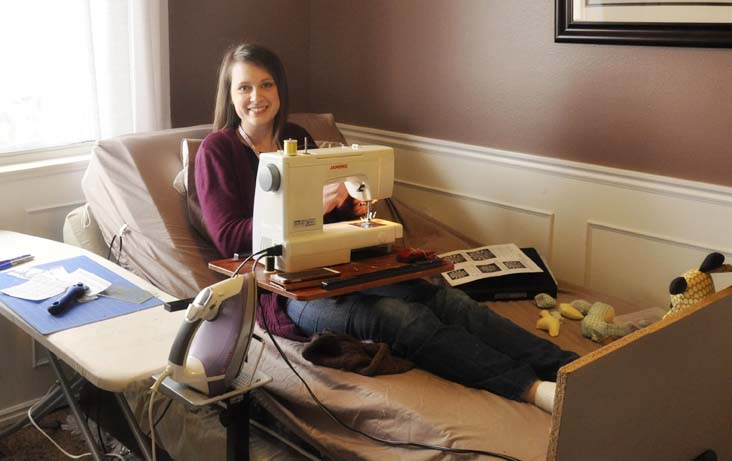
Jessica George of Sweetbriar Sisters, created a “sewing bed” so she can rest while working on her sewing projects.
Photo courtesy of Jessica George
“It’s the only way I could figure out how to work around my illness,” says Jessica George, of Sweetbriar Sisters, who designs sewing patterns for soft toys, pillows, etc. George has postural orthostatic tachycardia syndrome, or POTS – a chronic condition that affects her heart and leaves her extremely fatigued. (Read her story here.)
She tried working as a freelance designer, but her condition made that impossible. “My heart has to work extra hard. Just casually walking around my house, my heart is pumping as fast as someone out for a run.” She gets worn down quickly and within a short time “my body is exhausted to the point of being physically ill.”
Ditto for plush toy maker Jenny Maj, of Fluffmonger®. Maj’s autoimmune problem (fatigue, pain, hypersensitivity, migraines and some neurological issues), variously diagnosed as lupus and Lyme disease, was the impetus for leaving her teaching job. She turned to crafting as therapy, learned to sew, and started working with organic materials.
Being her own boss allows her to focus on her health. “There are times when I have deadlines, and I just have to push through whatever I’m dealing with. But that’s more manageable than when I was working a traditional job,” Maj says.
“Self employment allows me to take a nap if I am tired, go to doctor appointments, etc., and still make time to do the work I need to do,” says Allison Harris, of Lotus Rising Handbags.
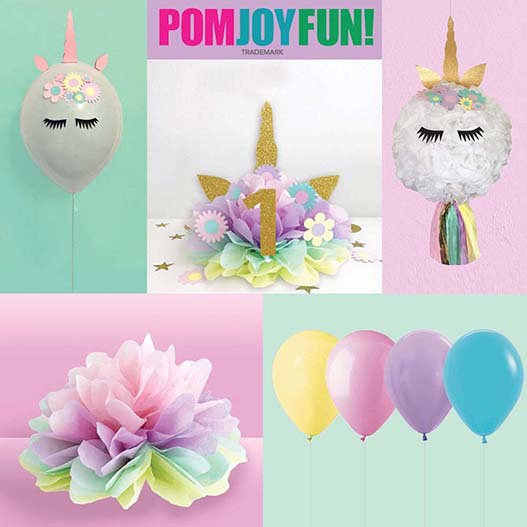



Kim Bart’s PomJoyFun company creates a variety of party decor..
Photoscourtesy of Kim Bart
“I am stronger than I would have believed,” says Harris, who has lupus, fibromyalgia and a heart condition. “I may have a chronic illness, but that illness does not define who I am, or what I can do, unless I allow it to.”
“I know that whatever comes, I can deal with it,” adds George. “I used to get freaked out when big problems came up, but now they just feel like a to-do list I need to check off. Huge medical bills? Ok, let’s revamp the budget. Stuck on pregnancy bed rest? Let’s figure out how not to get stir crazy.”
Bart learned that “I am able to adapt and make money in a variety of situations. I found that I like peaceful, calm environments and that I am stronger than I ever thought.”
Before her health challenges, Maj notes, “I didn’t know who I was or how to ask for what I needed or desired. When my health left me unable to live up to some people’s expectations, I felt worthless and went through a dark time. After a lot of self-loathing, I eventually realized that I can’t please everybody, and I can’t bring happiness to anyone if I don’t prioritize my own needs. Hitting that low point helped me understand that I need to do whatever it takes to cultivate happiness in my own life before I can extend myself to helping others.”
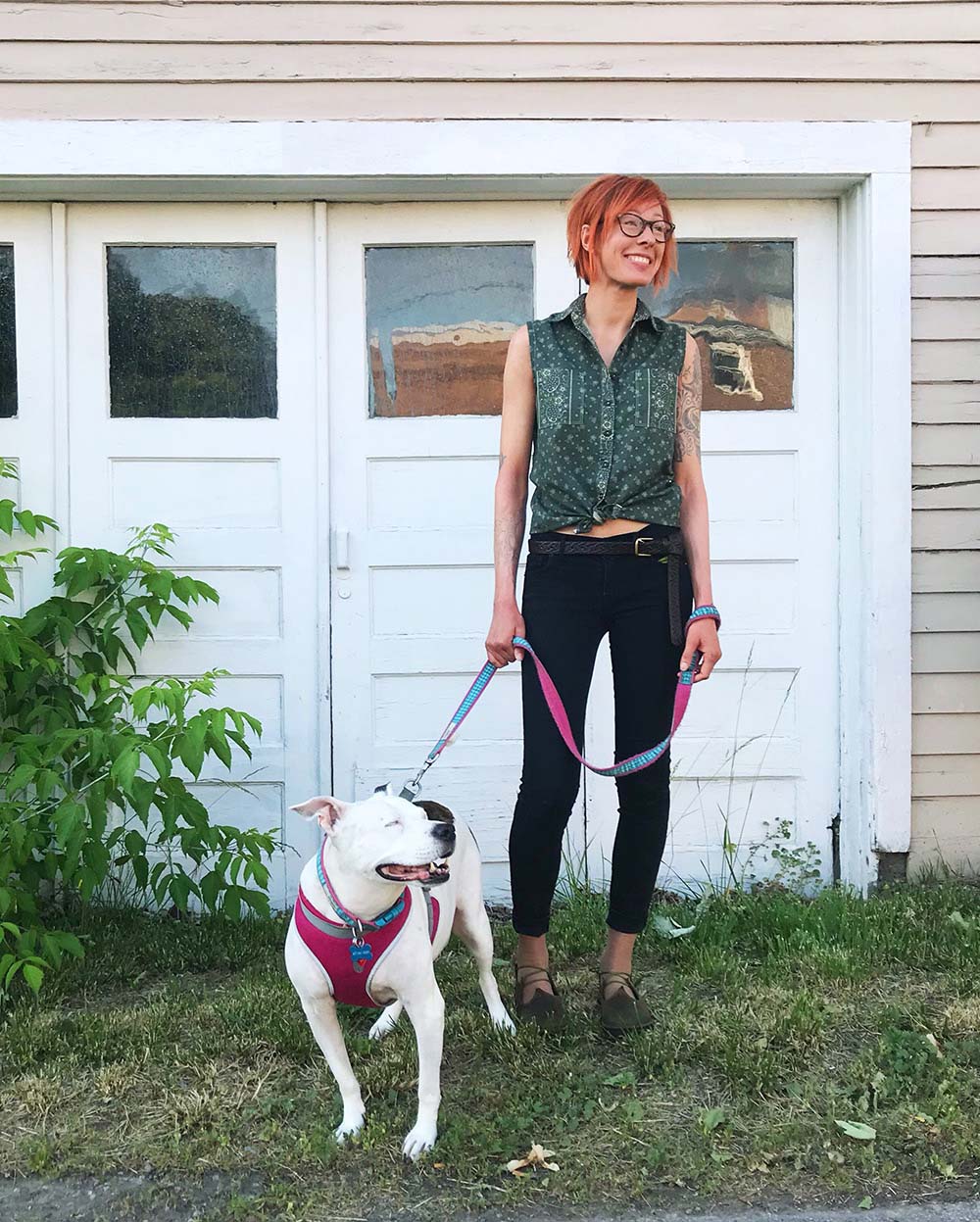
Rochelle New with Lucille, her beloved rescue dog.
Photo courtesy of Rochelle New
“I don’t hide” my condition, says George, “but I go back and forth on how much to share. A lot of healthy people don’t realize that this type of life is a reality for many. It’s important not to hide our health issues. But I don’t want to whine and complain so much that people roll their eyes and think I’m over-exaggerating for attention. It’s a fine line, and one that I am constantly re-examining.”
At first, Maj was reluctant to share much about her illness, “but over time, I began to feel it was necessary. I try not to share too much, but I try to keep (customers) informed of why I take breaks from blogging or why I’m not doing craft shows or teaching in-person classes.” (Read more here.)
Harris, too, was reluctant to over-share. “I was ashamed,” she admits. But when you share, she says, “you realize you are not alone. I learned that I am more than this body, more than this illness, and I am not ashamed to tell people now. There are many challenges in life, and chronic illness is no less or more than any other. Sharing our challenges can be a light that illuminates our path, as well as the path of others, and draws us all together. I share now because it might help someone else.”
Bart, on the other hand, does not make her information public. “I’ve thought about it, but people affected by my disease aren’t necessarily my audience so at this point it doesn’t make sense. The only way I would share is if I was going to advocate and donate to a cause.”
Here are some tips for managing your business if you have a chronic illness:
Choose to be positive and have a sense of humor
“Attitude is everything,” says New. “No one can give you a positive attitude. You have to invent it. I am solely responsible for my own mental and emotional wellness. I am in charge of my own self-worth, my state of mind, my motivation, my ability to smile, and keep my chin up. That’s on me.”
When she shared her story, she did it with humor, likening her scaly skin to being a mermaid; using puns, such as “shedding” a light on her condition; and calling her rapid skin regeneration her superpower.
“I’ve dealt with my fair share of haunting anxiety, depression, and torment,” she says. “But if I’ve learned anything from growing up with ichthyosis, it’s that you have to have a sense of humor and a positive outlook.”
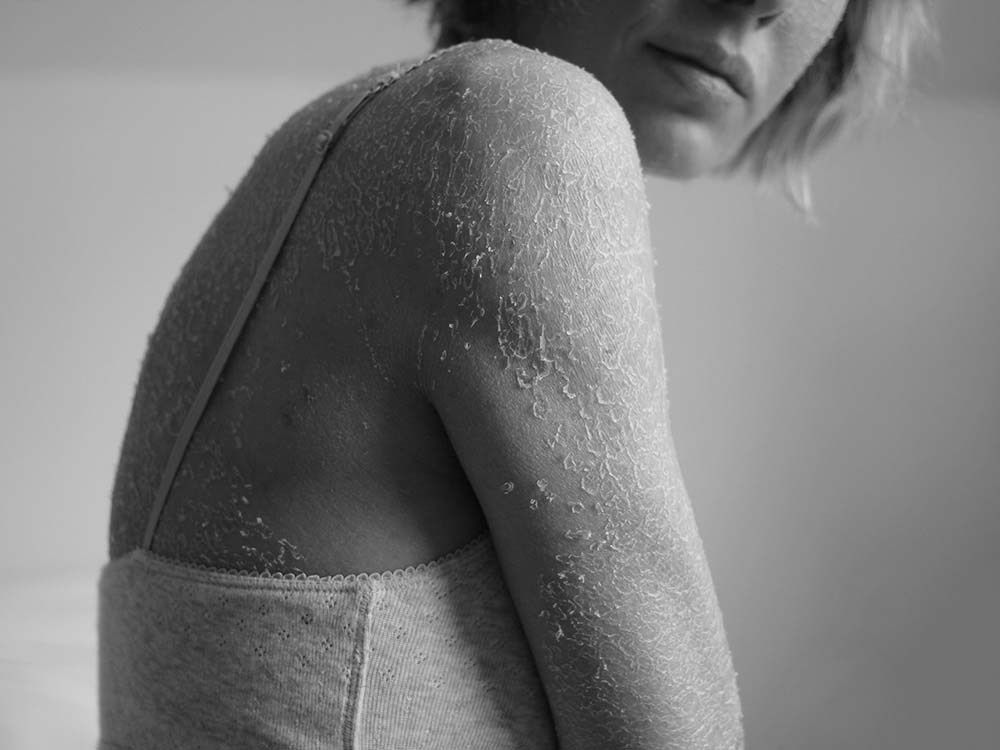
Rochelle New, who creates yarn bags, totes and other fabric items at Home Row Fiber Co., has a skin disease called lamellar ichthyosis.
Photo courtesy of Rochelle New
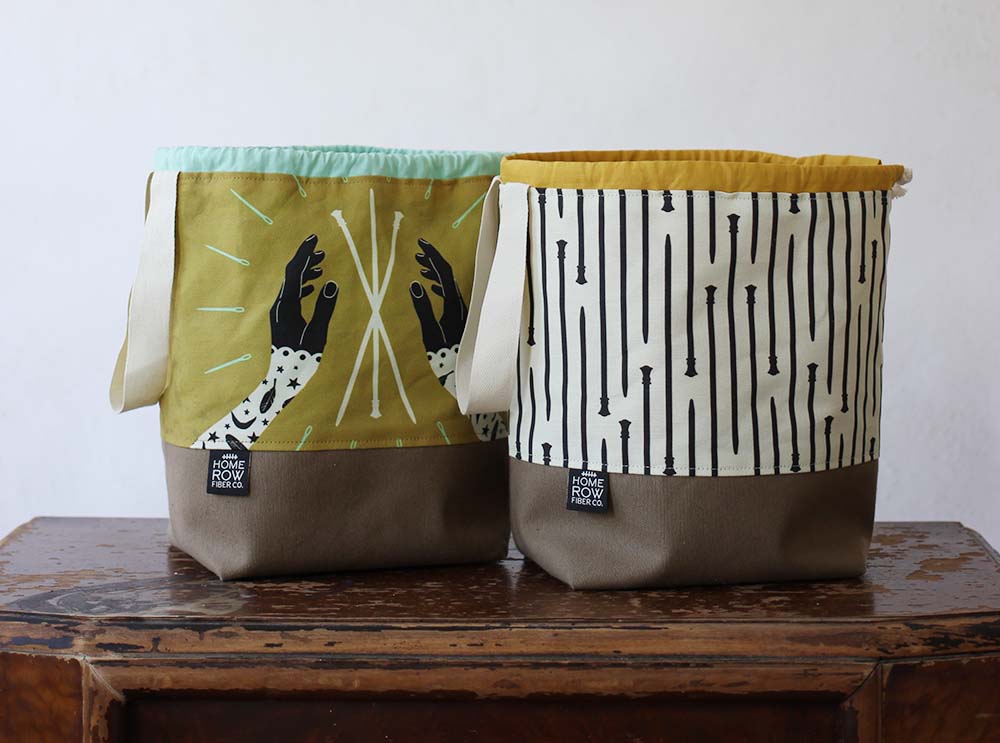
Two products from Rochelle New’s Home Row Fiber Co.
Photo courtesy of Rochelle New
Don’t be afraid to talk about your condition or ask for help
“I work hard to stay up-beat and strong but the truth is I have tough, bad days,” says New. “So does every single person on earth. Talk about it. In order to invoke compassion, tolerance, and empathy in people, they first must be informed. You’re providing the script for others to speak up for you in the same way. Never be afraid to give people permission to care about you.”
After blogging about her health, Maj received “countless messages offering support, and many shared stories about their own health struggles. It was eye-opening to see the number of people walking a very similar path to mine.”
Harris reaches out to others – often strangers – who are also struggling. “Most people are willing to share advice and resources,” she says. “We become blessed by blessing others. If you are brave enough to ask, others are loving enough to take your outstretched hand.”
Adapt your business to your needs, know your limits, and let go of perfection
George figured out ways to conserve her energy. Sewing at her desk was too tiring so she now has a “sewing bed,” and comfy furniture near a table in every room for frequent rests. “The first thing we check when buying a new car is how comfortable the passenger seat is when fully reclined.”
Giving up the sewing portion of her business helped George. “I design new products when I feel well and let my automated website take care of selling when I am too sick to work,” George says. “I’ve turned down opportunities to work with other companies and grow my business. But I am so grateful to have found a way to work with my health issues.”
Maj, who used to hand dye and sew her softies herself, also moved towards pattern making. “The shift has been good for me because I get to spend more time designing, and I’ve been able to revisit my love of teaching.”
Maj adds, “I worry about not blogging or posting on social media enough or driving enough traffic. There’s not enough time in the day for me to give everything the amount of attention I’d like. I am vigilant about focusing my time on what sustains me, not necessarily what will bring me the most money, social media fans, or website traffic.”
New says, “I let my (health) cycles guide my workflow and productivity.”
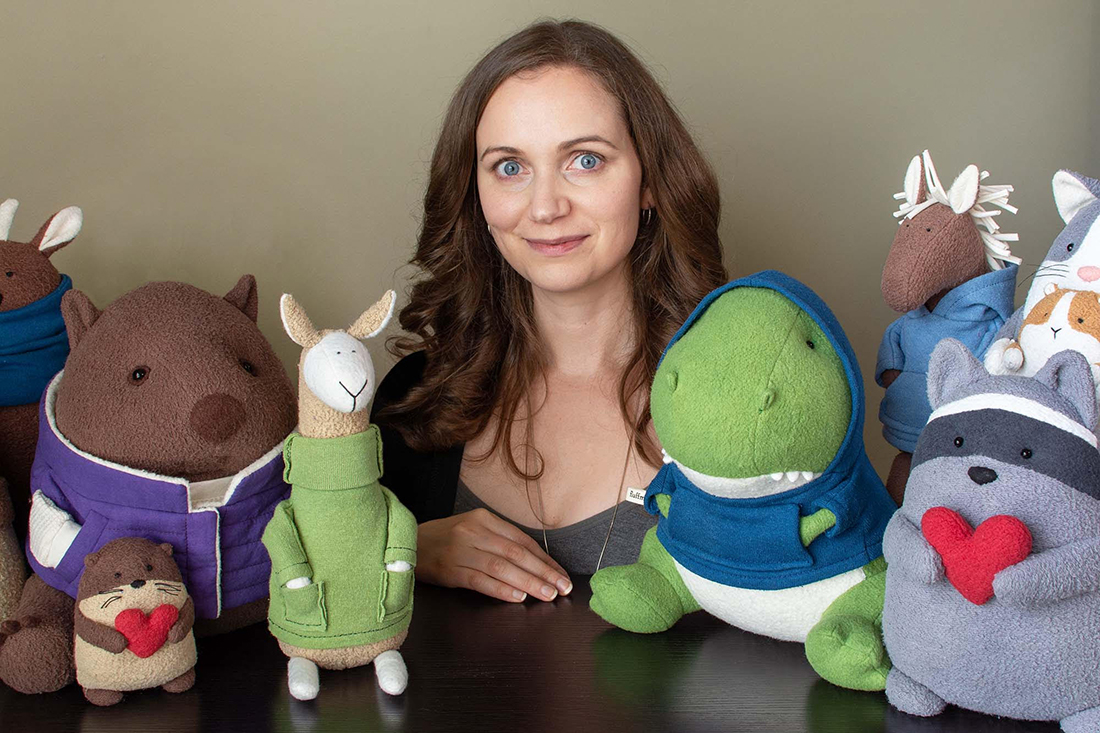
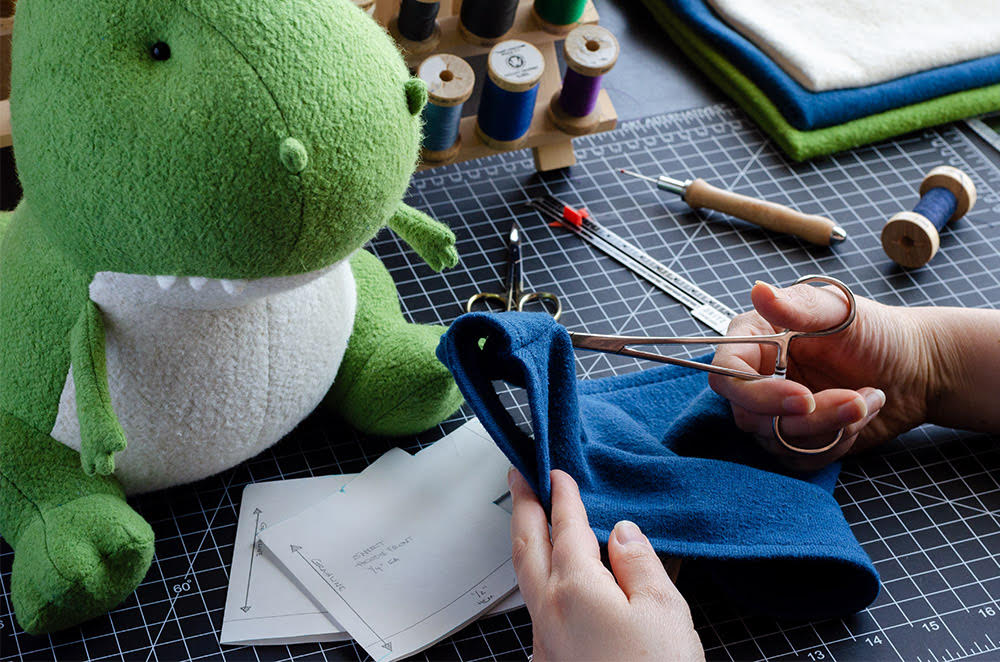
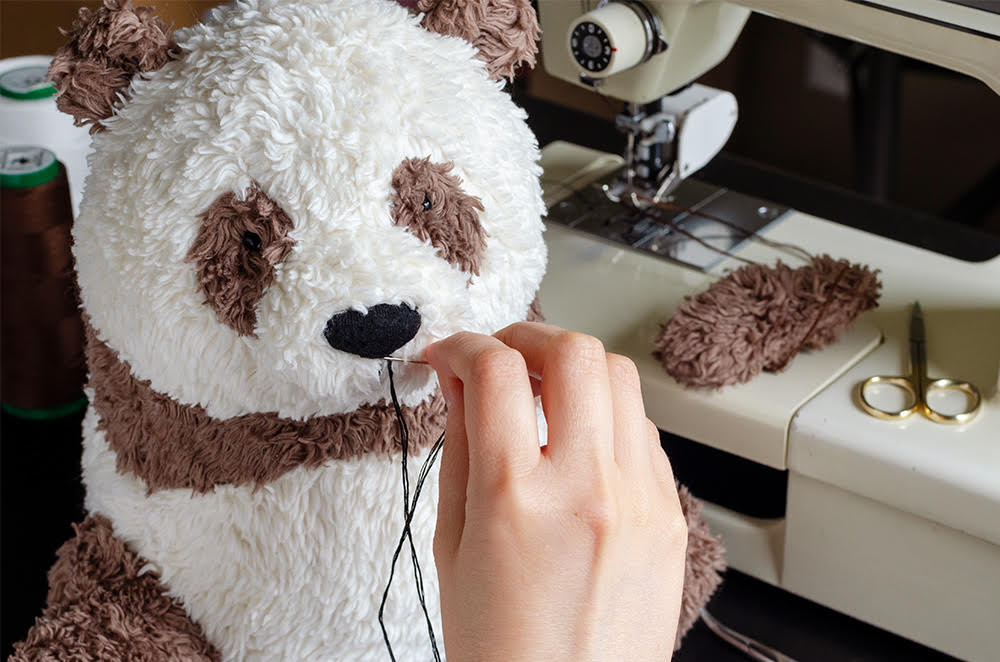
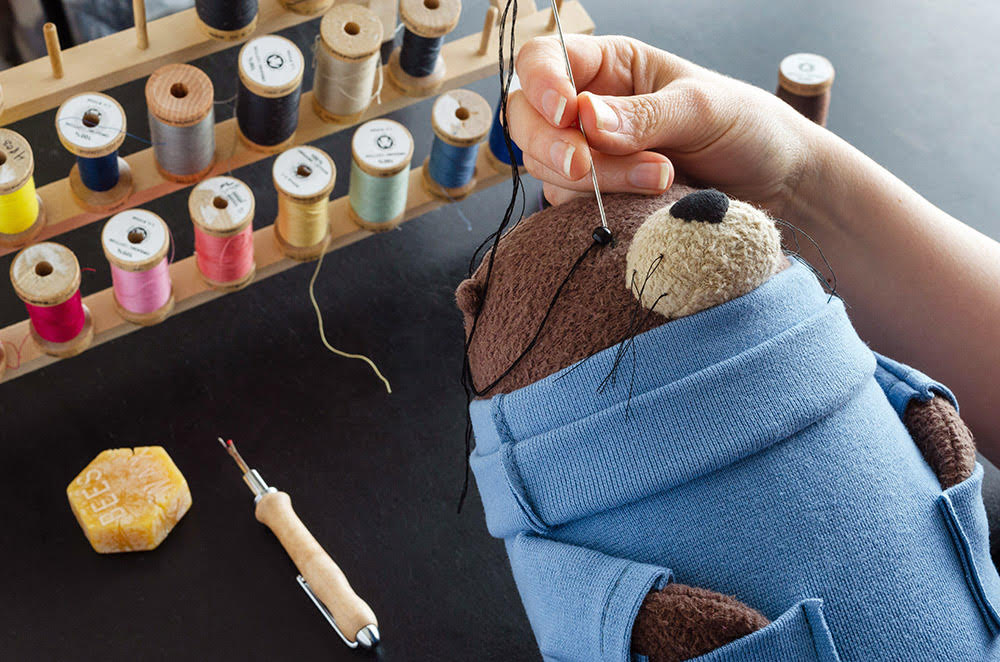
Jenny Maj, owner of Fluffmonger, creates soft fabric animals.
Photos courtesy of Jenny Maj
Set goals
Maj uses visualization boards to list goals, updating her board when she accomplishes things.
“Keep making goals and don’t give up on your dreams,” she urges. “If there’s something you really want to do with your business, or your life, don’t let a diagnosis get in the way of accomplishing that. You may have to modify your path to the end goal, but you’ll learn so much about yourself along the way. You may even find that your goal ends up transforming into something greater than you could have imagined.”
Keep life simple, pace yourself, and practice self care
“I only have a small amount of energy each day, so when I wake up I think, ‘What one thing can I do today’,” says George. Sometimes dishes don’t get done, floors don’t get mopped. But that’s ok. “Our life is simple, filled with paper plates, grocery delivery services, and more Netflix than I will ever admit to. Letting the every-day stuff slide a bit to work towards the long-term stuff feels so much better in the end.”
Harris practices and teaches mindful meditation, which she says has been “a real life saver.”
“Practice self care,” she advises. “Take time for things like yoga, poetry, music, nature, friendships, family. I also lean heavily on my spiritual beliefs.”
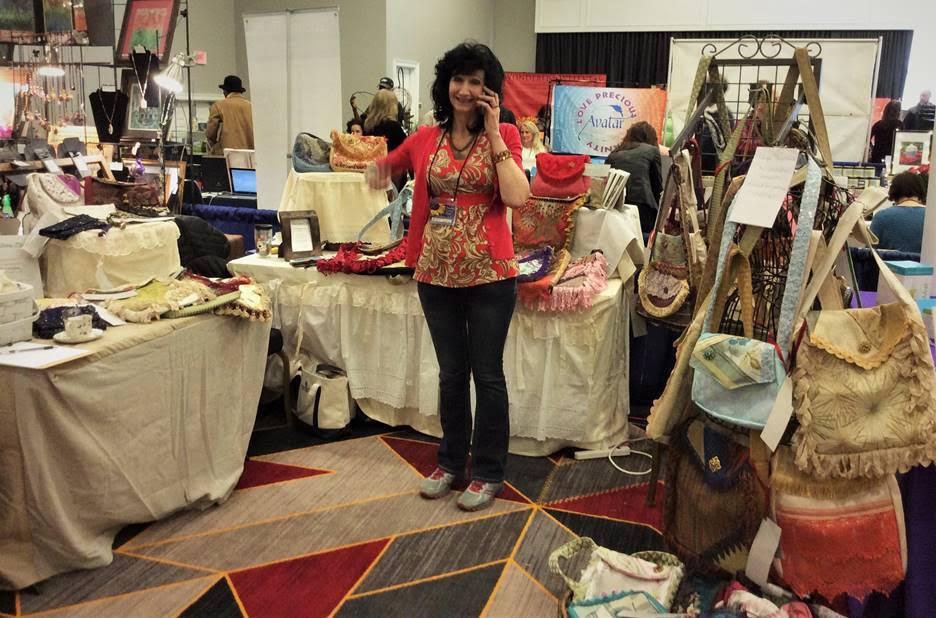
Allison Harris, owner of Lotus Rising Handbags, sells some of her handmade purses and bags at Pathways Magazine Natural Living Expo.
Photos courtesy of Allison Harris
Keep things in perspective and savor the positive moments
Maj tracks joyful moments. “If a customer sends me a sweet message or photo, I take a screenshot. If I see wildlife or a cute dog at the park, I take a picture. If someone does something nice for me, or something makes me smile, it goes in my notes. It’s easy to forget moments like those, so keeping track lets me return to them and get a boost when I need it.
“I try to keep things in perspective,” she adds. “It’s easy to get down and feel isolated, but I know I’m not the only person in the world presented with challenges.”
Having a chronic illness, Harris says, “has allowed me to be deeply grateful for every single day. It has truly taught me that each day is a gift.”

Roberta G. Wax
contributor
Roberta Wax is an award-winning journalist and imperfect crafter. A former news reporter, her freelance articles and projects have appeared in a variety of newspapers and magazines, from the Los Angeles Times and Emmy magazine to Cloth Paper Scissors, Somerset Studio, Craftideas, Belle Armoire, etc. She has also designed for craft companies. Although she has no art background she was a crafty Girl Scout leader. www.creativeunblock.com


As one working through my challenges, thanks for the inspiration!!!
I actually sighed as I read this article! As someone diagnosed with Fibromyalgia and a degenerative spinal issue I am always embarrassed about how limited my energy is . Few people can understand it simply because they cannot without experiencing it. I appreciate reading about how others manage their creative lives while juggling to manage their symptoms!
Thank you for this very inspiring article. So many of us suffer in silence. I, too, realize that more blog posts, Instagrams posts, etc., would benefit my business. However, I decided to honor my daily struggles: can’t write anything positive? No problem. The blog stays mute and I can focus my energy on looming deadlines.
thank you. I have just been diagnosed or rather I am going through diagnosis for an autoimmune disorder. I cried as I read this article and learning that many of the emotions that I am feeling are part of this path that I have in front of me now. Thank you for showing how others are managing their health and business challenges.
Such a wonderful article Roberta. Very inspiring and helpful to know so many of us walk such similar paths.
Fantastic article! I was very fortunate to be able to stay at home to raise my kiddos…6 months of pregnancy bed rest with all 3 taught us we could survive on one income. But when the recession hit I had to do something to help. I had a small hemming, mending, and minor alterations business and I was able to work around how I felt. I only took customers who I knew and it really helped with things like yearbooks, school photos, and uniforms (a water polo speedo…$40 😵). I became known for being able to do the impossible, and my business grew to the point of being a little too much. Eventually some people became demanding and it was no longer enjoyable or healthy for me, so I closed my business. Around that same time my sister started a business that involved sewing and she asked me to come onboard. The beauty is that she has given me full creative license in my area of expertise and allows me to work at the pace that is comfortable for me, which with fibromyalgia, fluctuates daily. Thank you for highlighting an area and reality that is so often misunderstood (“you look great, why are you complaining?!?”)
This article has been a Godsend for me. I have been disabled due to physical (chronic pain due to spinal problems) and I can totally relate to the women featured in this article. My husband assists me in all that I do, and without him, I don’t know how I would take care of myself. I run a a home-based quilting and sewing business that has struggled in recent years because I can’t give it my all because of the pain. What is very upsetting to me is people who don’t “see” my disability and think that I’m faking it. Some members of my family are a part of those people who don’t believe me. If they only knew.
I greatly appreciated this candid article and wish the best for these ladies in their lives and business endevours!
Thank you for sharing this! One of the reasons, which I have not publicized, is that I left a corporate position to start my own quilt pattern design business because of my health issues. I deal with several autoimmune issues, which often dictate how much work I can do. On good days, I am the energizer bunny. On bad days, I am lucky to be able to climb the stairs… Knowing others are successful, while dealing with similar issues is so uplifting!
Laureen, do you have any “secrets to your success” that you could pass on to some of us who are struggling to make it financially in our businesses?
Thank you,
Diane Wiscott
Thank you for sharing! As someone with POTS, Migraines, and Eosinophilic Esophagitis its hard to feel like you have people! This makes me so happy and thankful.
So glad to hear that this resonated with you!
This reminds me of a quilter years ago who had MS but inquired about testing our quilt patterns. She was upfront about her unpredictable energy level which got me thinking how I could help her (as someone challenged with multiple chemical sensitivities for 35 yrs). I would send her projects to test that gave her at least a month to finish. We never met as I’m in Seattle and she was in Iowa, but I loved receiving her cheery emails and personal notes tucked into her tested quilt tops. She loved knowing a package of fabrics was coming to her mailbox – a project to work on – and a source of income.
What a great relationship to have! That’s amazing.